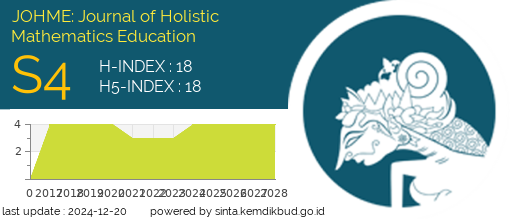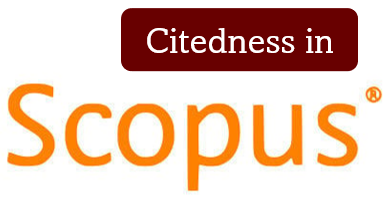THE USE OF REALISTIC MATHEMATICS EDUCATION IN TEACHING THE CONCEPT OF EQUALITY
DOI:
https://doi.org/10.19166/johme.v1i2.913Keywords:
concept of equality, algebra, Realistic Mathematics Education, RME, Konsep persamaan, aljabar, Pendidikan matematika realistisAbstract
Algebra is one of the most fundamental concepts in learning mathematics and the concept of equality is an essential part of learning algebraic topics. However, many students find this concept difficult to understand. The problem is the difficulty of the content and how to teach it. In order to solve the problem, this paper reviews the use of the theory of Realistic Mathematics Education (RME) in teaching the concept of equality. RME is a process of teaching and learning mathematics in a contextual way as mathematics is considered as a human activity. This paper aims to review the use of the RME theory in teaching the concept of equality within the Biblical perspective as the parameter of the implementation for mathematics as one of God’s tools to reveal His glory and wisdom. The method used in this paper was literature review which used literature findings as the resources. According to the literature research, it was found that the main problem in teaching and learning the concept of equality was students’ misconception of equality. The use of the RME theory can help teachers to teach the “equality” concept to help student learn contextually.
BAHASA INDONESIA ABSTRAK: Aljabar merupakan salah satu konsep paling dasar dalam pembelajaran matematika mendalam dan konsep persamaan merupakan bagian yang penting dalam mempelajari topik-topik aljabar. Namun ada murid-murid yang mendapati bahwa konsep persamaan sulit dimengerti. Permasalahannya adalah seputar sulitnya materi yang dipelajari dan cara pengajarannya. Untuk mencari solusi dari permasalahan tersebut, makalah ini akan mengkaji penggunaan teori Matematika Realistis dalam pengajaran konsep persamaan. Matematika Realistis adalah proses belajar mengajar matematika kontekstual yang memandang matematika sebagai aktifitas manusia. Makalah ini bertujuan untuk mengkaji penggunaan teori Matematika Realistis dalam pengajaran konsep persamaan di dalam perspektif Alkitabiah sebagaimana matematika adalah alat Allah untuk menyingkapkan kemuliaan dan hikmat-Nya. Metode yang digunakan dalam makalah ini adalah studi literatur yang menggunakan temuan-temuan literatur sebagai sumber. Berdasarkan studi literatur, masalah utama dalam pengajaran konsep persamaan adalah adanya miskonsepsi pada pemahaman murid dan menggunakan teori Matematika Realistis, pengajar dapat mengajar konsep “keseimbangan” untuk membantu murid belajar secara kontekstual.
References
Benson, F., & Findell, B. (2012). A modified discovery approach to teaching and learning abstract algebra. Innovations in Teaching Abstract Algebra. Retrieved from https://sites.google.com/site/itaanotes60/articles/benson
Byl, J. (2008). A Christian perspective on math. Reformed Perspective, 27(4), 9-13. Retrieved from http://bolyai.cs.elte.hu/~mesti/ChristianMath.pdf
Cai, J., Lew, H., Morris, A., Moyer, J., Ng, S., & Schmittau, J. (2005). The development of students algebraic thinking in earlier grades: A cross-cultural comparative perspective. ZDM, 37(1), 5-15. DOI: https://doi.org/10.1007/bf02655892
Cajori, F. (1930). A history of mathematical notations, vol. 1: Notations in elementary mathematics. The Mathematical Gazette, 15(208), 170-171. DOI: https://doi.org/10.2307/3607176
Carpenter, T., Franke, M., & Levi, L. (2003). Thinking mathematically: Intergrating arithmetic and algebra in the elementary school. Portsmouth, NH: Heinemann.
Dickinson, P., & Hough, S. (2012). Using realistic mathematics education in UK classrooms. Retrieved from http://mei.org.uk/files/pdf/rme_impact_booklet.pdf
Freudenthal, H. (1973). Mathematics as an educational task. Dordrecht, Netherlands: Springer. DOI: https://doi.org/10.1007/978-94-010-2903-2
Freudenthal, H. (1991). Revisiting mathematics education: China Lectures. Dordrecht, Netherlands: Springer Netherlands. DOI: https://doi.org/10.1007/0-306-47202-3
Gordillo, W., & Godino, J. (2014). Preservice elementary teacher's thinking about algebraic reasoning. Mathematics Education, 9(2), 149-164. Retrieved from http://www.iejme.com/makale/187
Gravemeijer, K. (1994). Developing realistic mathematics education. Utrecht, Netherland: CD-Beta-Press. Retrieved from http://www.cdbeta.uu.nl/tdb/fulltext/199503-terwel2.pdf
Gravemeijer, K. (2008). RME theory and mathematics teacher education. In D. Tirosh, & T. Wood. The International Handbook of Mathematics Teacher Education: Tools and processes in mathematics teacher education (pp. 283-302). Rotterdam, Netherlands: Sense Publisher. Retrieved from https://www.sensepublishers.com/media/1081-the-handbook-of-mathematics-teacher-education-volume-2.pdf
Gravemeijer, K., & Doorman, M. (1999). Context problems in realistic mathematics education: a calculus course as an example. Educational studies in mathematics, 39, 111-129. DOI: https://doi.org/10.1023/A:1003749919816
Heddens, J., & Speer, W. (2001). Today's mathematics. New York, NY: John Wiley & Sons, Inc.
Knight, G. (2006). Philosophy and education: An introduction in Christian perspective. Berrien Springs, MI: Andrews University Press.
Knuth, E. J., Alibali, M. W., Hattikudar, S., McNeil, N. M., & Stephens, A. C. (2008). The importance of the equal sign understanding in the middle grades. Middle Teaching in the Middle School, 13(9), 514-519. Retrieved from https://eric.ed.gov/?id=EJ792400
McNeil, N., & Alibali, M. W. (2005). Knowledge change as a function of mathematics experience: All contexts are not created equal. Journal of Cognition and Development, 6(2), 285-306. DOI: https://doi.org/10.1207/s15327647jcd0602_6
McNeil, N., Grandau, L., Knuth, E. J., Alibali, M. W., & Stephens, A. S. (2006). Middle-school students’ understanding of the equal sign: The books they read can’t help. Cognition and Instruction, 24(3), 367-385. DOI: https://doi.org/10.1207/s1532690xci2403_3
Miller, G. (2010). Teaching mathematics with a Biblical worldview and historical perspective. Retrieved from http://www.belhaven.edu/pdfs/worldview-papers/Georgia-Miller.pdf
Rossnan, S. (2006). Overcoming math anxiety. Mathtitudes, 1(1), 1-4.
Van de Walle, J., Karp, K., & Bay-Williams, J. (2010). Elementary and middle school mathematics teaching development. Upper Saddle River, NJ: Pearson Education, Inc.
Zonnefeld, V. (2015). Practical applications of an integrally Christian approach to teaching mathematics. Perspectives on Science and Christian Faith, 67(2), 124-134. Retrieved from https://www.asa3.org/ASA/PSCF/2015/PSCF6-15Zonnefeld.pdf
Downloads
Published
How to Cite
Issue
Section
License
Authors who publish with this journal agree to the following terms:
1) Authors retain copyright and grant the journal right of first publication with the work simultaneously licensed under a Creative Commons Attribution License (CC-BY-SA 4.0) that allows others to share the work with an acknowledgement of the work's authorship and initial publication in this journal.
2) Authors are able to enter into separate, additional contractual arrangements for the non-exclusive distribution of the journal's published version of the work (e.g., post it to an institutional repository or publish it in a book), with an acknowledgement of its initial publication in this journal.
3) Authors are permitted and encouraged to post their work online (e.g., in institutional repositories or on their website). The final published PDF should be used and bibliographic details that credit the publication in this journal should be included.”










